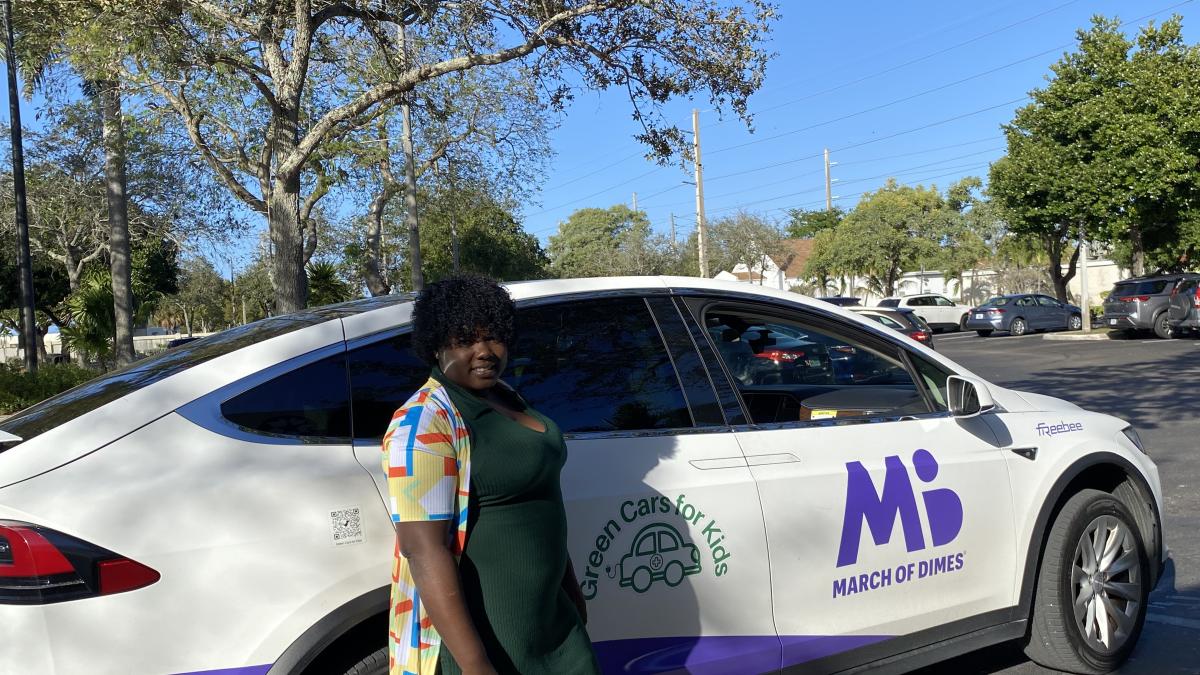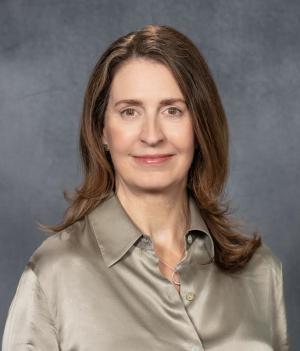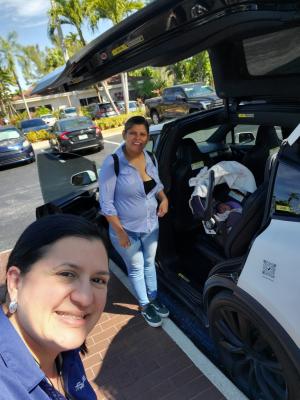
Dr. Catherine Toms, MD, MPH, founded Green Cars for Kids to address both the maternal and child health crisis and the climate crisis. This non-profit helps expectant mothers and children travel to and from health care visits using a transportation service reliant on electric vehicles.
In the U.S., the transportation sector is the leading source of greenhouse gas emissions, which contribute to the warming climate by trapping heat in the Earth’s atmosphere. Pregnant women and children are particularly vulnerable to the health risks associated with air pollution because of their weakened and developing immune systems. And, adverse pregnancy outcomes linked with air pollution are disproportionately felt by BIPOC and low-income individuals compared to their counterparts.
Connecting the dots: Climate, transportation, and health equity

After receiving her bachelor’s degree in zoology, Toms moved to Munich where she completed medical school. She then moved to Norway to practice gynecology and family medicine. While in Europe, Toms was inspired by the culture of environmentalism where recycling, using resources wisely and valuing the environment was natural.
After thirteen years in Europe, Toms moved back to the U.S. with her family where she immersed herself in public health through volunteer work and then received her master’s degree in public health from the University of Alabama at Birmingham. She worked with March of Dimes, a non-profit dedicated to advancing maternal and child health, to understand barriers to maternal and child health care. Lack of transportation was repeatedly identified as a barrier to care.
In Birmingham, Toms attended a guest lecture from Dr. Jeremy Hess, director of the Center for Health and the Global Environment, about the impacts of climate change on health.
It was during this lecture that Toms had an “ah-ha” moment that would heavily influence the trajectory of her career. “I realized that nothing, or very little of what I was doing to promote maternal and child health was going to matter if I didn't address the health impacts of climate,” she says.
Soon thereafter, Toms moved to Florida where she was committed to pursuing work at the intersection of climate and health. She volunteered with Florida Clinicians for Climate Action where she informed health professionals, lawmakers and the public about the health harms of our changing climate, focusing primarily on exposure to heat and air pollution.
She also consulted for Health Care Without Harm, an international organization aiming to reduce the environmental impact of health care institutions worldwide.
Drawing on her past experiences, Toms identified a web of connections between climate change, transportation and maternal and child health. She also recognized major gaps in our collective response to these issues.
So in 2021, Toms started the non-profit Green Cars for Kids. “I started realizing that people aren't doing certain things even though there are problems identified that need to be addressed,” she says. “And I finally said to myself, ‘Well, if nobody's doing it, I've got to do it.’”
Green Cars for Kids: A multifaceted solution

Green Cars for Kids uses electric vehicles to help children and expectant mothers get to and from health care visits. Their model provides free and equitable transportation while reducing air pollution and greenhouse gas emissions. This non-profit was modeled on Kid One, which has a similar mission but does not use an electric fleet.
In the first 21 months, the organization’s two-car pilot fleet in Broward and Miami-Dade counties provided 5,416 trips to 1,672 unique clients living in areas with the highest rates of preterm birth and infant mortality in South Florida.
Toms points to collaboration between people who care as a major driver in this success. The impact of Green Cars for Kids would not be possible without coordination from local health departments, clinics and hospitals, an electric transportation provider, drivers and board members – all with a unified commitment to making a difference.
Being a family-centered service, Green Cars for Kids removes as much stress as possible from riders. Well-trained drivers are a critical component of this.

“Our drivers are the ‘secret sauce,’” Toms says. “They are patient, they want to be there and they really form bonds with our families.”
Each driver takes a course to learn how to install car seats and some even teach this skill to expectant mothers. Other children are welcome to come along, so mothers don't have to find care for them. Riders may also invite trusted individuals to join them. Sometimes, this support system can help with language translation, or simply help the rider feel more comfortable.
“Action is the antidote to despair”
Toms often reminds herself of a quote from singer and activist Joan Baez, “Action is the antidote to despair.”
Toms encourages others to take action as well. When you do, “you'll feel empowered, and you'll find a path,” she says. “And you don't necessarily have to choose a climate-focused career. You can build climate action into every single career you choose.”
This summer, Green Cars for Kids will launch a new program in Palm Beach County.
“We have the tools, groundwork and infrastructure to expand and we’re eager to help others build solutions for their communities,” Toms says. ”Because that's what it's all about… making the world a better place, and having healthier people on a healthier planet.”
Green Cars for Kids is looking to expand its reach and network. If you or someone in your network knows a clinic or county where their services could make a difference, reach out to Green Cars for Kids.